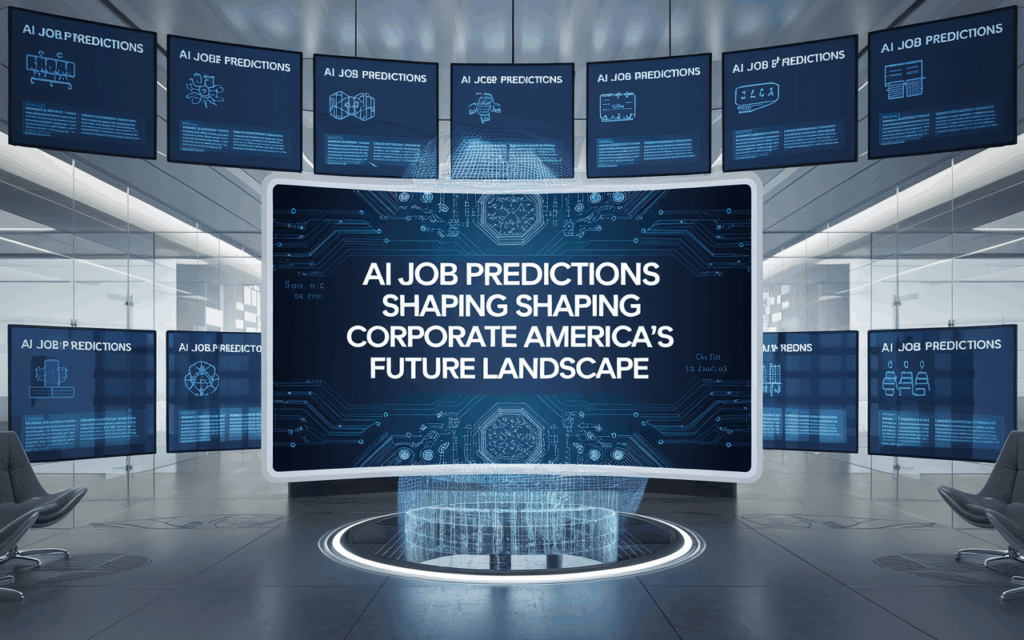AI Job Predictions: Corporate America's New Competitive Sport 🏆🤖
In a world continually reshaped by technology, the emergence of Artificial Intelligence (AI) has placed our job market under a spotlight — one that casts both excitement and trepidation. Recent statements from industry leaders have thrown down the gauntlet regarding the potential impacts of AI on our workforce, igniting discussions that feel more akin to a competitive sport than a serious matter of economic policy! 💼⚡
The Shocking Predictions
On May 28, Anthropic CEO Dario Amodei raised eyebrows by claiming that up to 50% of entry-level jobs could disappear within five years due to AI, possibly pushing U.S. unemployment rates as high as 20%. This alarming projection has fellow executives rushing to voice similar concerns, as if they’re competing to unveil the most jarring forecast. 📉😱
The Wall Street Journal's recent article highlights how CEOs from various sectors are jumping on the bandwagon, declaring doom and gloom that has transformed the narrative around AI job displacement into a competitive arena. Imagine a race where the stakes are personal livelihoods, and everyone is sprinting towards the finish line of "who can predict the worst," rather than collaborating to innovate, adapt, and mitigate these disruptions! 🏁💔
For instance, during JPMorgan's annual investor day, their consumer banking chief noted that AI would likely lead to a 10% workforce reduction. Meanwhile, Amazon's Andy Jassy warned employees to prepare for a "once-in-a-lifetime" industry overhaul. Ford's Jim Farley sent shockwaves through the room by asserting that AI would “literally” replace half of all white-collar workers in the U.S. — a claim so sweeping it's hard to wrap your head around! 😳🚀
A Dramatic Shift in Tone
The significance of these statements isn't lost on anyone watching the tech landscape. It's a dramatic departure from previous cautious approaches to discussing job displacement. Once, tech giants were known for downplaying fears around AI, and now they have swapped that sentiment for cautionary tales that suggest sweeping changes are imminent, whether society is prepared or not. 🌀🔥
The Path Forward
So, where do we go from here? How can we navigate this unpredictable terrain while ensuring that the workforce is not left behind in this AI revolution? 🌈✨
-
Embrace Lifelong Learning: Workers must be encouraged to continuously upskill and reskill to thrive alongside AI advancements. Companies should invest in training programs that prepare employees for future roles that AI cannot fulfill. 📚🔧
-
Balance Benefits with Responsibility: While automating tasks can boost productivity, it's vital for companies to adopt ethical approaches to AI deployment. Bridging the gap between tech innovation and societal responsibility is crucial for sustaining a balanced economy. ⚖️🌍
-
Promote Inclusive Dialogue: Leaders should aim to cultivate environments where discussions around AI's impacts are thoughtful, inclusive, and constructive. It’s not just about warning of the storm, but working together to build a sturdy ship to weather it! 🌊🤝
In conclusion, as these leaders continue to throw down impersonally ominous predictions, it's equally important that we channel this energy towards solutions and adaptability in the workplace. Let’s transform this competitive sport into a collaborative effort for a brighter future. Because in the end, the goal should be to harness AI's potential while ensuring that innovation uplifts us all! 💡🌟
Stay tuned as we navigate these changes and advocate for a workforce equipped to thrive in the age of AI! 💪🤖
Join the Conversation!
What are your thoughts on the impact of AI on jobs? How can we prepare for these predicted changes? Let’s talk in the comments and share our insights! 💬👇
#AIJobs #FutureOfWork

More Stories
Meta’s AR Ambitions and AI Safety: Insights from the Equity Podcast
Insight Partners Data Breach: A Wake-Up Call for Cybersecurity Awareness
Lovable’s Ascendancy: Anton Osika at TechCrunch Disrupt 2025